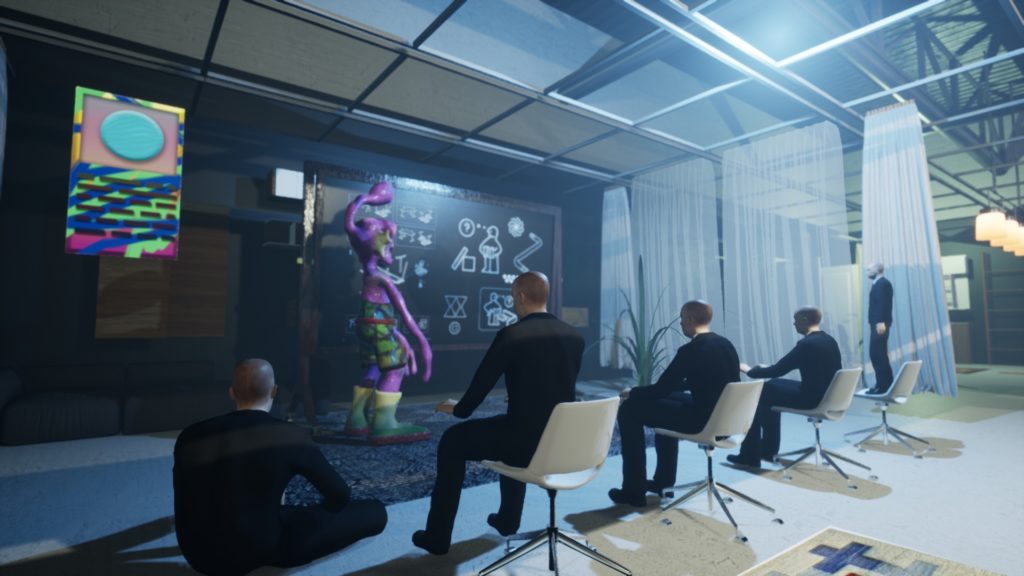Glitches in the Simulation
The Phillips x Daata artist commissions
By Michael Connor
Jun 26, 2019

In Jeremy Couillard’s HOTR Home Furnishing, an IKEA-like warehouse store serves as a re-education camp for billionaires following the Earth‘s salvation at the hands of aliens. As a necessary condition of the transition to a more equitable and climate-friendly society, the aliens are attempting to retrain the billionaires of the old world to perform humble and useful tasks—specifically, to assemble prefab furniture.
This work, along with Rachel Rossin’s Recursive Truth, was commissioned as part of a partnership between Phillips auction house and Daata Editions, an initiative that aims to cultivate a market for born-digital art. Exhibited at Phillips’s galleries in New York in April and June respectively, both works probed the possibilities and limits of world building and simulation as political gesture.
Couillard’s video takes the form of a third-person video game where we hover over the shoulder of a small alien as they try to navigate the labyrinthine superstore to find the parts necessary for a lamp for their new terrestrial home. As we follow them, we see billionaires attempting to decipher the instructions for unskilled furniture assembly. White, besuited men, they make a kind of generic and faceless presence for the most part, although it is clear that they are struggling to acclimate to their new, admittedly rather dismal, reality.
When the alien protagonist finally locates the necessary lampshade to complete their mission, a tall blonde besuited man throws it in a fit of pique, exclaiming, “That lampshade was my father!” The moment is almost a throwaway, and it has no impact on the course of our alien”s mission: the protagonist simply retrieves the lampshade, and soon they’re back in their newly illuminated home. And yet this incident somehow reframes the entire piece, putting the world it proposes in a certain light, or perhaps illuminating an all-too-familiar mindset of elite victimhood. The billionaire, re-education notwithstanding, has seemingly learned…not very much.
The world in HOTR Home Furnishing differs from our own in several respects, but the most crucial one is that it is a world that has been granted a reprieve—a reprieve from the sense of onrushing disaster, ecological and humanitarian, accelerated by capitalist greed and fossil fuels, that seems to characterize our present moment. Couillard chooses to focus not on the escapist aspects of this fantasy, but instead on one of the costs. By showing the billionaires’ camp, Couillard suggests that this particular utopia can’t be achieved without neutralizing resistance from the top—not even with the help of aliens.
HOTR Home Furnishing is typical of Couillard’s work in that whether he is making games, digital paintings, or videos, he often brings entire fictional universes to life. In an interview conducted alongside the release of HOTR Home Furnishing, Couillard discusses his interest in the kind of rapid world building that video game engines (in this case, Unreal) allow. The Unreal Engine allows Couillard to build a world and set it in motion, creating the sense of a fully immersive system that is structured around different rules than the ones that govern our day-to-day realities. Painting and comics, Couillard’s first loves, allow for similar explorations, but worlds that are built in software differ from more traditional forms of rendering in that they can seem to have lives of their own. There is, too, some agency in digital systems—the aggregate agency of the people who built it that filters through a vast supply chain of hardware, minerals, and code. Worlds built in software exceed their maker’s intentions; Couillard describes his work as a kind of collaboration with the software itself. This collaborative aspect makes the project of world building much less predictable and perhaps gives digitally constructed worlds a privileged relationship with the social realities they aim to experiment with.
…
The works by Rossin and Couillard from the Phillips and Daata Editions collaboration represent variations on the philosophically rich question of the relationship between world and world building. For Couillard, rapid prototyping of alternate utopian realities becomes a way to isolate dystopian aspects of the present. For Rossin, world building is a way of engaging directly and materially with the dense technocratic systems that structure much of our reality. (“They used to tell me I was building a dream…”) Both of their positions have a great deal to teach us about our current reality, in which simulation plays an important role.
Faced with news cycles that seem increasingly apocalyptic and unbelievable, social media users have frequently made reference of late to the simulation hypothesis–the idea that our lives are actually playing out inside an artificial simulation by some incomprehensibly powerful supercomputer: “There’s a glitch in the simulation.” It’s a kind of ironic humor, intended to signal how powerless we all are in the face of this technocratic system—and in this respect, it’s also a kind of fantasy: those without power have no responsibility to act. Couillard and Rossin might concede that in some ways we do live in simulation, but their work reveals the simulation as real, material, having political import. That‘s no dream you’re building; it’s our world.
